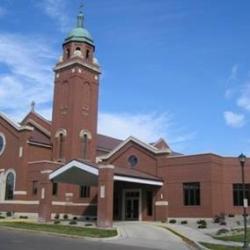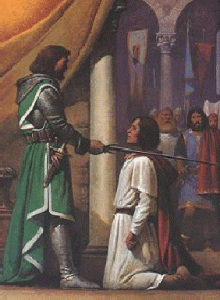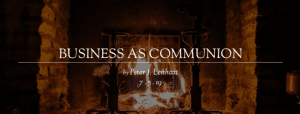Introduction to the Theologian and his Book Torture and Eucharist

William T. Cavanaugh is a Catholic theologian whose interests, besides theology, include economics and politics. The role of the Church in the world of politics and economics is central in his thought. He has been a professor of Catholic studies at DePaul University since 1910. Before that he taught at the University of St. Thomas in St. Paul, Minnesota. He is director of the Center for World Catholicism and Intercultural Theology. The center studies the Catholic Church in countries of the southern hemisphere.
This post introduces William T. Cavanaugh and his book Torture and the Eucharist: Theology, Politics, and the Body of Christ. It will be the subject of a number of posts.
Table of Contents for the series
- IntrodPeuction to Cavanaugh and the series (below)
- Torture and Eucharist, Introduction
- Torture and Society in Pinochet’s Chile
- Torture, Neo-liberalism, and the Fragmentation of Social Bodies
- Evolving Ecclesiology in Chile: COPACHI, the Vicariate, Excommunications
- Catholic Action and the Ecclesiology of a Disappearing Church
- New Christendom Fails to Challenge the State
- Mystical Body and True Body of Christ
- Performing the Body of Christ against Torture
- Eucharistic Imagination — Too Big to Fit in a Private Space
William T. Cavanaugh spent two years working for the Church in a poor area of Santiago, Chile, under the military dictatorship of Augusto Pinochet. That regime started with the military coup against socialist president Salvador Allende in 1973 and lasted until 1990. It was there that Cavanaugh learned both the horror of torture as an essential part of Chilean statecraft and the long process by which the Church learned to respond.
Cavanaugh says his major areas of research concern
… the Church’s encounter with social, political, and economic realities. I am especially interested in the social implications of traditional Catholic beliefs and practices, such as the Eucharist. (From DePaul University’s online page on Cavanaugh)
William T. Cavanaugh, author and speaker
My first acquaintance with the thought of William T. Cavanaugh came via Youtube. One of his many appearances there finds the causes of the recession of 2007 in a kind of excessive and world-denying spirituality. That talk featured prominently in my post on Two Spiritualities of Banking. Since then I have read and profited from a number of his books. His major works include, in order of their publication:
- Torture and the Eucharist: Theology, Politics, and the Body of Christ. Oxford: Blackwell Publishing, 1998.
- Theopolitical Imagination. New York: T&T Clark, 2003.
- The Blackwell Companion to Political Theology, with Peter scott, Oxford: Blackwell Publishing, 2004.
- Being Consumed: Economics and Christian Desire. Grand Rapids, Michigan: Eerdmans Publishing, 2008.
- The Myth of Religious Violence: Secular Ideology and the Roots of Modern Conflict.Oxford: Oxford University Press, 2009.
- Migrations of the Holy. Grand Rapids, Michigan: Eerdmans Publishing, 2011.
- An Eerdmans Reader in Contemporary Political Theology, with Jeffery W. Bailey, and Craig Hovey, eds. . Grand Rapids, Michigan: Eerdmans Publishing, 2012.
- Field Hospital: The Church’s Engagement With a Wounded World. Grand Rapids, Michigan: Eerdmans Publishing, 2016
- Evolution and the Fall, with James K. A. Smith, eds. Grand Rapids, MI: Eerdmans, 2017
William T. Cavanaugh’s thought will be a continuing interest on my blog. He has thrown unexpected light on a number of traditional themes in Catholic theology.
Torture and the Eucharist
In several posts I will take up the early work Torture and the Eucharist: Theology, politics, and the Body of Christ. Here Cavanaugh finds Christianity in the midst of the political struggle in the Chile of dictator Augusto Pinochet. He characterizes the state-sponsored torture of that regime as a kind of liturgy to which the Church opposes the liturgy of the Eucharist.
The book highlights the changing role of the Church in the midst of the tyranny and oppression of the Pinochet regime in Chile from 1973 to 1990. It’s a change not only in tactics but also in ecclesiology. The development in Chile mirrored changes the Church went through since the Middle Ages. There was a period you might call Christendom, when Church and state were nearly identical. Then, in reaction, Church and state claimed separate spheres of influence, soul and body. The final stage in Chile began when the state turned to torture as a mode of operation. The Church then realized that handing the body over to the state meant losing also the soul. It had denied the Church any means of resistance.
Eventually the Church in Chile recovered both itself and the Eucharist. With Cavanaugh I found new meaningfulness in both as, in different ways, the Body of Christ. Lessons in Church history include familiar names of theologians leading up to Vatican II, like Jacques Maritain and Henri de Lubac. Cavanaugh reveals the effects of torture on soul no less than body and on the body of society and why martyrdom is important for the Church.
A bit about Chile today: the aftermath of Pinochet and torture
Eduardo Frei Montalva was president of Chile before Salvador Allende, whom the 1973 Pinochet coup overthrew and murdered. Frei also was murdered in 1982 by accomplices to the Pinochet regime. They poisoned him while hospitalized at a private clinic. Frei had become an outspoken opponent of the regime. The Guardian reported in January of this year that
six people were sentenced to between three and 10 years in prison for carrying out, covering up and serving as accomplices in the crime. They include Frei Montalva’s driver, doctors and former agents of Pinochet.
According to the Guardian, “40,018 people were imprisoned, tortured or slain during the dictatorship. Chile’s government estimates that of those, 3,095 were killed, including about 1,200 who were forcibly disappeared.”
Among the victims were about 300 tortured and at least 100 murdered at a site called Colonia Dignidad. The site was run by a former medic in the Nazi army. Charged with child abuse in Germany he had fled to Chile in 1959. He died in a prison hospital in 2010, according to another Guardian article.
Colonia Dignidad, renamed Villa Baviera, is now a resort hotel, run by a daughter of another leader of the torture center. There tourists regale themselves with German beer and the beautiful scenery.
It is also a grave site, and recently relatives of the “disappeared” have found remains of some of the loved ones. They object to the mass murder site’s being used as a leisure center. They want Chile to close Villa Baviera and replace it with a memorial.
Chile still struggles with the legacy of the Pinochet regime of torture.
Image credit: Youtube via Google Images












